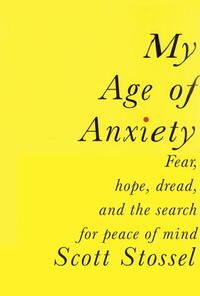You need to sign in or sign up before continuing.
Take a photo of a barcode or cover
152 reviews for:
My Age of Anxiety: Fear, Hope, Dread, and the Search for Peace of Mind
Scott Stossel
152 reviews for:
My Age of Anxiety: Fear, Hope, Dread, and the Search for Peace of Mind
Scott Stossel
emotional
funny
hopeful
informative
inspiring
reflective
medium-paced
As someone who has dealt with chronic anxiety their whole life, as well as having other diagnoses, this was a super informative read that left me feeling hopeful. The author was really good at looking at all sides of the disorder, such as genetics, pharmaceuticals, and nature vs. nurture. I am left feeling hopeful, yet shrugging my shoulders because I don't think scientists will ever know what truly causes anxiety disorder. Read this book if you want a thorough examination of the disorder with added memoir-type experiences throughout.
Graphic: Mental illness
Este anxietatea patologică o tulburare medicală, aşa cum susţin Hipocrate şi Aristotel şi farmacologii moderni? Sau este o problemă filozofică, aşa cum cred Platon şi Spinoza şi terapeuţii cognitiv-comportamentalişti? Este o problemă psihologică, un produs al traumei din copilăriei şi al inhibiţiei sexuale, aşa cum consideră Freud şi acoliţii lui? Sau este o afecţiune spirituală, aşa cum au afirmat Søren Kierkegaard şi descendenţii săi existenţialişti? Sau, în sfârşit, este – aşa cum au declarat W.H. Auden şi David Riesman şi Erich Fromm şi Albert Camus şi nenumăraţi comentatori moderni – o afecţiune culturală, o funcţie a timpurilor în care trăim şi a structurii societăţii noastre? Adevărul e că anxietatea este în acelaşi timp o funcţie a biologiei şi filozofiei, a corpului şi a minţii, a instinctului şi a raţiunii, a personalităţii şi a culturii. În timp ce anxietatea este retrăită la un nivel spiritual şi psihic, poate fi măsurată ştiinţific la nivel molecular şi fiziologic. Este produsă de natură şi este produsă de cultură. Este un fenomen psihologic şi un fenomen sociologic. În termenii tehnologiei informatice, este deopotrivă o problemă de hardware (circuitele mele nu sunt bine montate) şi o problemă de software (rulez programe greşite de logică care mă fac să am gânduri anxioase). Originea temperamentului are multe faţete; dispoziţiile afective care par să aibă o sursă unică, simplă – o genă proastă, să spunem, sau o traumă din copilărie – s-ar putea să aibă mai multe. La urma urmei, cine poate afirma că lăudatul echilibru interior al lui Spinoza nu deriva mai puţin din filozofia lui cât din biologia lui? Nu se poate oare ca un nivel scăzut, programat genetic, de activare a sistemului nervos autonom să fi produs filozofia lui senină, şi nu invers? Nu trebuie să caut departe ca să găsesc dovezi că anxietatea este o trăsătură familială. Străbunicul meu Chester Hanford, care a fost mulţi ani decan la Harvard, a fost internat la sfârşitul anilor ’40 la Spitalul McLean, celebrul spital de boli psihice din Belmont, Massachusetts, suferind de anxietate acută. Ultimii 30 de ani din viaţa lui au fost adesea agonie. Deşi medicamentele şi tratamentele cu electroşocuri aduceau uneori remisiuni ale suferinţei lui, astfel de răgazuri erau temporare, iar în cele mai întunecate momente din anii ’60 era doar un ghem fetal în dormitorul lui, scoţând ceea ce părinţii mei îşi amintesc drept gemete neomeneşti.
Way more interesting than I expected it to be. Gives a thorough overview of the history of anxiety and treatment, along with the author's personal experiences with vomiting phobia and social anxiety. Becomes slightly repetitive towards the end. Footnotes occasionally too protracted. Would preferably give it 3.75/5.00
informative
slow-paced
Rated: 2.5 stars
I purchased this book based on all the excellent reviews but sadly, this book just did not captivate me like so many others. I regret purchasing the book and instead wish I would have just borrowed the digital copy from the library.
I appreciate the authors' research and his courage in documenting and sharing his personal account of his mental health issues with anxiety however I found the material overwhelming, dry and in many places quite boring. The book also didn't flow as nicely as I expected it to and I found all the footnotes to be rather annoying and in fact, it struck me that if I were ever to attempt to write a book I would probably do the same thing because I tend to ramble and would probably struggle with creating a cohesive story.
I also (and I'm sure other reviewers will jump on me for this) found the author a tad bit whiny (ouch, I know). I mean, I get it you have anxiety. I have suffered from panic attacks in the past, and I know many others who have as well so I'm not unsympathetic to the experiences and the struggle however, there was just a tone in some parts of the book that made me feel less empathetic which I regret.
In summation, the book just wasn't the book for me but despite my initial concerns I laboured through and finished the book. There were some passages I highlighted and found intriguing but otherwise, this book just didn't strike a chord with me and for that I am disappointed.
I purchased this book based on all the excellent reviews but sadly, this book just did not captivate me like so many others. I regret purchasing the book and instead wish I would have just borrowed the digital copy from the library.
I appreciate the authors' research and his courage in documenting and sharing his personal account of his mental health issues with anxiety however I found the material overwhelming, dry and in many places quite boring. The book also didn't flow as nicely as I expected it to and I found all the footnotes to be rather annoying and in fact, it struck me that if I were ever to attempt to write a book I would probably do the same thing because I tend to ramble and would probably struggle with creating a cohesive story.
I also (and I'm sure other reviewers will jump on me for this) found the author a tad bit whiny (ouch, I know). I mean, I get it you have anxiety. I have suffered from panic attacks in the past, and I know many others who have as well so I'm not unsympathetic to the experiences and the struggle however, there was just a tone in some parts of the book that made me feel less empathetic which I regret.
In summation, the book just wasn't the book for me but despite my initial concerns I laboured through and finished the book. There were some passages I highlighted and found intriguing but otherwise, this book just didn't strike a chord with me and for that I am disappointed.
informative
reflective
medium-paced
Scott Stossel is a man who suffers from severe anxiety. His book describes some of the history of anxiety and ways to treat it. I found it educational and entertaining, learned quite a bit
Em "Meus Tempos de Ansiedade", Scott Stossel, motivado a desmembrar o mal que o afetou durante toda sua vida, escreve sobre ansiedade a partir de suas próprias experiências e diferentes perspectivas da psicologia, medicina e filosofia.
Mesmo sendo um livro extenso, a leitura consegue ser fascinante e até prazerosa. É interessante ler sobre as várias abordagens e como ainda não se chegou a uma conclusão sobre o assunto, além de ser uma oportunidade para refletir sobre si mesmo e sobre como a ansiedade é retratada na cultura popular.
Além disso, o autor reflete sobre suas vivências e seu histórico familiar. Ele descreve momentos em que a ansiedade representou um grande desafio em sua vida, tendo que se submeter a diversos tratamentos terapêuticos e vários remédios desde criança.
"Uma ex-colega de trabalho certa vez me chamou de “Frontal humano”, dizendo (...) que projeto tanta serenidade que o mero fato de eu estar presente pode tranquilizar outras pessoas: só por entrar numa sala cheia de gente agitada ministro meu bálsamo tranquilizante. Diante de mim, as pessoas relaxam. Se ela soubesse!" .
Mesmo sendo um livro extenso, a leitura consegue ser fascinante e até prazerosa. É interessante ler sobre as várias abordagens e como ainda não se chegou a uma conclusão sobre o assunto, além de ser uma oportunidade para refletir sobre si mesmo e sobre como a ansiedade é retratada na cultura popular.
Além disso, o autor reflete sobre suas vivências e seu histórico familiar. Ele descreve momentos em que a ansiedade representou um grande desafio em sua vida, tendo que se submeter a diversos tratamentos terapêuticos e vários remédios desde criança.
"Uma ex-colega de trabalho certa vez me chamou de “Frontal humano”, dizendo (...) que projeto tanta serenidade que o mero fato de eu estar presente pode tranquilizar outras pessoas: só por entrar numa sala cheia de gente agitada ministro meu bálsamo tranquilizante. Diante de mim, as pessoas relaxam. Se ela soubesse!" .
I liked this, even though I didn't get all the way through it. Good to see there's someone out there even more screwed up than me.
All I could think of as I was reading this was "Finally, someone understands me!" As someone who has suffered from Generalized Anxiety Disorder paired with various phobias for the majority of my life, this book offered explanations, relief, and support by assuring me that I am definitely not alone. Stossel was able to put into words things that I think about all of the time from fears to attempts in explaining these fears to friends and family and finally, the secrecy and hiding of it all in order to avoid the ultimate fear of people finding out about our disorder and labeling us "crazy" for it. For anyone who has ever had irrational phobias, panic attacks, or just plain and simple fears that they think about on a regular basis, I strongly encourage you to read this book!






